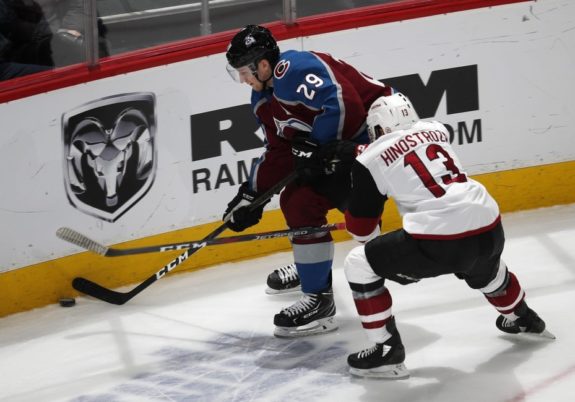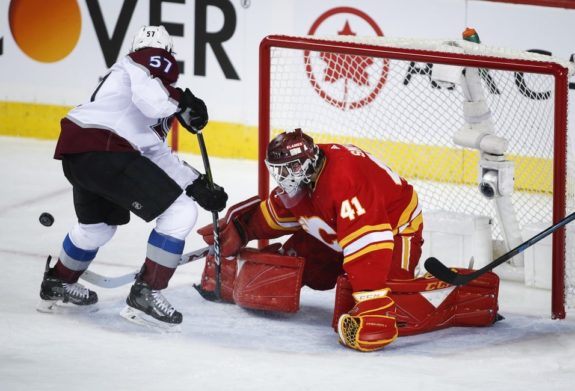The Colorado Avalanche lost their first game in the playoff series against the Calgary Flames. But the loss wasn’t as tragic as the 4-0 score indicated. The Avalanche played well in some areas and with a little tweaking, could very well roar back to vie for the series win. Colorado needs to focus on three key areas to sustain their playoff dreams.
Special Teams Need to Be Special
The Avalanche’s special teams were NOT very special in the first game. The power play failed to score on four separate man advantage opportunities. Four. It’s the playoffs. Teams need to seize on every little mistake and capitalize on them. The Avalanche power play did neither.
The Avalanche didn’t register a shot on goal until their last 10 seconds of their second power play. That’s 3:50 of power play time without notching a shot on goal. That’s special, but it’s special in a bad way. Colorado didn’t manage any sustained offensive pressure until their third power play when they managed to get three shots on net. They at least needed to put some pressure on the net, which also proved problematic.

But the power play wasn’t the only disappointing effort. The penalty kill unit allowed two goals on Calgary’s five opportunities. Both came at critical times in the game – one with just over a minute left to go in the second period, the other with only three minutes left in the third. They were momentum killers.
The Avalanche also failed to clear the puck. They got hemmed in their own zone and while they managed a fair number of blocks, they did not do a good job disrupting Calgary’s setup. Colorado was reactive and actually created more problems for their own goaltender – Phillip Grubauer – than they prevented. That’s not the kind of play that helped the point streak down the stretch run for the postseason.
Of course, if the Avalanche hadn’t been called for six infractions, that might have helped. They took a lot of penalties for the first game in a series, especially when there wasn’t any actual fighting.
Little mistakes cost in the postseason and the special teams made a lot of them.
Put Sustained Pressure on Net
The Avalanche offense managed to get into Calgary’s zone but they didn’t sustain pressure on goaltender Mike Smith. In fact, Colorado did a lot of dump and chase, which did not help the players get near the crease. They also shot wide and were then unable to get quality shots on net. They rarely screened Smith and had almost no chance at a tip or deflection, one of the Avalanche’s bread and butter scoring moves. Colorado made it to the playoffs by driving the net and mixing it up. They need to return to that kind of play.

The team also needed to change up their shot target. Colorado kept shooting towards Smith’s glove side and he was excellent with his mitt. It was puzzling they didn’t try aiming more for his stick side, especially since scouting reports indicated Smith was strong with his glove. That’s a simple tweak which shouldn’t take much adjustment.
Colorado’s offensive push was also hampered by their inability to win crucial face-offs. Colorado struggled with face-offs this season. In fact, they ranked 26th for the regular season. But they won games because they could win crucial puck drops. Nathan MacKinnon won 4-of-17 while Carl Soderberg won 5-of-13. That hurt and should have been addressed during the game.
Because Calgary was good at disrupting the Avalanche’s offense, Colorado’s defense spent a lot of time falling back to defend when the forwards lost the puck. It limited the number of times they could help sustain forward pressure on the offensive end of the ice. Near the end of the regular season, the defensemen contributed on nearly 75 percent of the goals. When they have to keep falling back to disrupt breakaways, the defensemen have less opportunity to push the play through the neutral zone. Addressing their other offense issues should take care of that problem.
Play the Hot Skaters
For whatever reason, coach Jared Bednar did not adjust well on the fly in the first game. He played the Avalanche’s top three forwards for over 20 minutes apiece as well as defenseman Barrie. However, he had other good skaters who were having success but played limited minutes.
Forward Tyson Jost managed to get some good looks at the net and was out-skating the Flames. Yet, he played less than eight minutes all night and only 32 seconds on the power play.

His lack of effective usage sits squarely on the coaching staff.
But he’s not alone. Forward Matt Calvert, the little man who fights for space against bigger opponents, didn’t even play 10 minutes. Derick Brassard, the trade deadline pickup with 90 playoff games under his belt, played 13:45 yet tied for second most shots on goal for the Avalanche (with three) and made three hits.
On the other hand, Mikko Rantanen played 21:36 upon his return from injury and the rust showed. He got out-hustled and his timing wasn’t up to speed. All of which is to be expected in his first game back. Yet, he got more ice time than Jost, Calvert or Brassard, who were arguably more effective in their positions. It would have made a lot more sense to ease Rantanen back into the lineup and let the other forwards help carry the load.
Barrie, who played amazingly in March, racked up 24:41 in ice time, played 5:37 of power play time and yet managed only one shot on goal. That’s not all on Barrie.

He struggled to get shots through to the net, as did most of the team. However, since he wasn’t as effective as usual, the coaching staff should have tried mixing things up.
The team had other options. Playoff Ian Cole was up for the challenge. Yet he only played 16:31. The only Avalanche defenseman with fewer minutes than Cole was Patrik Nemeth. Cole’s previous 62 games of postseason play could have been an advantage. But instead they overplayed Barrie.
In the playoffs, the coaches need to play the skaters who are “on” for that night, not just the ones they are used to relying on. Frequently, the postseason allows other players to step up and make a significant impact. The Avalanche need to allow their players that chance.
The Avalanche Have Hope
While the Flames played a solid game, the Avalanche showed they can compete. They can make a few adjustments to improve their chances of winning. All of Colorado’s issues require tweaking, not a complete overhaul. The playoff series isn’t over yet. The gamesmanship has only just begun.